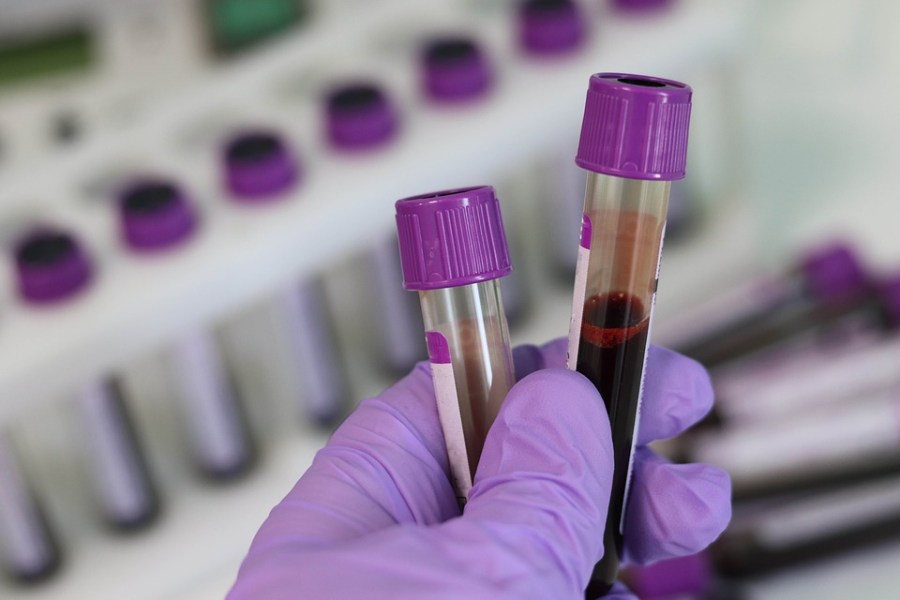Blood Test Needle Draws Blood From Vessel

You've probably heard the phrase, "It's in your blood" used to describe a trait, interest, skill, or focus that's simply innate, that cannot be separated from who you are. Blood permeates every part of our body, so the saying makes sense.
This is particularly true from a medical perspective. Blood analysis has developed to the point that many health problems can be quickly detected. However, it's easy to be confused by all the medical codes for blood tests. Here are some things you can discover from a blood analysis test in simple English.
Blood Glucose Levels and Diabetes
Diabetes occurs when your blood sugar isn't controlled naturally by your body. Testing blood for hemoglobin A1C can tell a doctor if your blood sugar levels are unusually high, which is one way to test for type two diabetes. An A1C level of 6.5 percent or higher on two separate tests indicates that you have diabetes. Results between 5.7 and 6.4 percent indicate prediabetes. Below 5.7 is considered normal.
Diabetes is a serious illness, and if not controlled, it can cause a host of health problems, including heart disease, nerve damage, kidney damage, eye damage, and more. If you have diabetes, you may need a blood test for kidney disease as well.
Red and white blood cells both serve an important function. Red blood cells carry oxygen, while white blood cells fight infection. The number of these cells can be found with a Complete Blood Count (CBC). This is not a fasting test, and it is quick and easy to have the blood drawn and return to your normal activities.
Too few red blood cells indicates you may have anemia, or low iron. You may need additional an additional iron test for blood. A high red blood cell count can indicate heart disease. For white blood cells, a low count can be caused by an immune disorder or even cancer. White blood cells are often considered cancer markers in a blood test. A high white cell count means you may have an infection.
All of these results then require further testing to see what's actually going on.
Cholesterol Levels
Your HDL (good cholesterol) and LDL (bad cholesterol) levels can be determined through blood tests as well. It's best if your HDL is over 55 – generally, the higher this number is, the better. For LDL, you want your levels below 100 – the lower the better. Your total cholesterol should be between 180-200.
High cholesterol can lead to heart disease, so it's important to keep these numbers under control.
Prostate Concerns
In men, blood analysis tests can detect prostate-specific antigen (PSA), a protein made by the prostate gland. By testing PSA levels, doctors can detect signs that a man might have an enlarged prostate, inflammation, or even prostate cancer.
PSA is only an indicator, but elevated levels in the blood definitely deserve attention and further testing. It's important to make sure your prostate is healthy and catch problems as early as possible.
Testosterone and Estrogen
Free testosterone and estradiol (estrogen) play important functions in the health of both men and women. For both sexes, low testosterone can lead to low moods and depression, low libido and less muscle tone and mass. Meanwhile, estradiol is a major factor in healthy bone density in both men and women. Low levels give you a higher risk of osteoporosis and bone breakage due to falls. In addition, low estrogen levels can be an indicator of increased risk of heart disease.
Your blood can tell you a lot about your overall health. If you have concerns about how you've been feeling, don't be shy about asking for blood analysis tests. Get your blood test results explained so you know exactly what's going on. You may even be able to view your blood test results online.
MORE FROM QUESTIONSANSWERED.NET
Blood Test Needle Draws Blood From Vessel
Source: https://www.questionsanswered.net/article/what-can-blood-analysis-tests-measure?utm_content=params%3Ao%3D740012%26ad%3DdirN%26qo%3DserpIndex
0 Response to "Blood Test Needle Draws Blood From Vessel"
Post a Comment